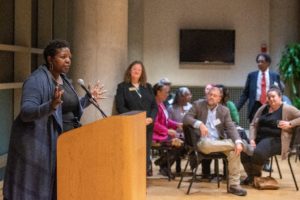PRESIDENT’S COLUMN
An Interview with AAG Executive Director Gary Langham (Part 2)
By Amy Lobben
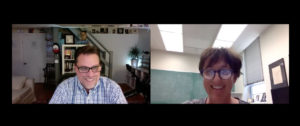 Last month I shared Part 1 of an interview I conducted with AAG’s Executive Director Gary Langham to help the membership learn a bit about his perspectives, goals, and personal history that led him to AAG. We met on August 19, close to the one-year anniversary of his first week in this role—half of which has been during the coronavirus pandemic. The interview lasted for over an hour, generating far too much to publish as a single column. This is the second part, which has been edited for brevity and clarity.
Last month I shared Part 1 of an interview I conducted with AAG’s Executive Director Gary Langham to help the membership learn a bit about his perspectives, goals, and personal history that led him to AAG. We met on August 19, close to the one-year anniversary of his first week in this role—half of which has been during the coronavirus pandemic. The interview lasted for over an hour, generating far too much to publish as a single column. This is the second part, which has been edited for brevity and clarity.
Continue Reading.
ANNUAL MEETING
Themes Announced for 2021 AAG Annual Meeting
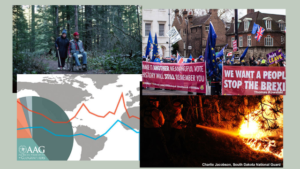 Four themes have been selected for the Seattle, WA annual meeting. Because of the extraordinary circumstances of the 2020 AAG Annual Meeting, three of the themes have been retained from 2020: Ethnonationalism and Exclusion Around the World; The Changing North American Continent; Expanding the Community of Geography. A new fourth theme has also been identified by AAG President Amy Lobben: Geographies of Access: Inclusion and Pathways. All themes will be soliciting papers, panels, posters, and sessions which integrate the topic at hand. The AAG identifies themes to help give each annual meeting a more specific focus, though any geography related topic is welcome for presentation.
Four themes have been selected for the Seattle, WA annual meeting. Because of the extraordinary circumstances of the 2020 AAG Annual Meeting, three of the themes have been retained from 2020: Ethnonationalism and Exclusion Around the World; The Changing North American Continent; Expanding the Community of Geography. A new fourth theme has also been identified by AAG President Amy Lobben: Geographies of Access: Inclusion and Pathways. All themes will be soliciting papers, panels, posters, and sessions which integrate the topic at hand. The AAG identifies themes to help give each annual meeting a more specific focus, though any geography related topic is welcome for presentation.
Read more about the annual meeting themes.
Register Today for the 2021 AAG Annual Meeting

Several deadlines are approaching for this year’s annual meeting: paper abstracts are due October 29 and prices for in-person registration will increase after October 29 as well. All abstracts for both in-person and virtual presentations will be accepted. Virtual registrants may present their work in either a paper or a poster session and participate in virtual panels. In-person attendees can present in virtual or in-person paper, poster, or panel sessions and may also choose to showcase their work in either a lightning paper or guided poster session.
PUBLICATIONS
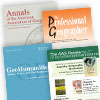 Read the latest issues of all of the AAG journals online:
Read the latest issues of all of the AAG journals online:
• Annals of the American Association of Geographers
• The Professional Geographer
• GeoHumanities
• The AAG Review of Books
ASSOCIATION NEWS
2020 AAG Regional Meetings Get Underway
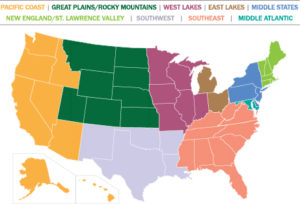 Several of the regional divisions of the AAG will host their annual meetings virtually during October and November. For those who have not recently attended a regional division meeting, they provide an excellent way to connect with geographers in your area in a more intimate setting than the AAG Annual Meeting. The regional division meetings also promote a supportive environment for student presentations of geographic research. Students are encouraged to apply for the AAG Council Award for Outstanding Graduate Student and Undergraduate Student Paper at a Regional Meeting which awards students with travel funding to the AAG Annual Meeting.
Several of the regional divisions of the AAG will host their annual meetings virtually during October and November. For those who have not recently attended a regional division meeting, they provide an excellent way to connect with geographers in your area in a more intimate setting than the AAG Annual Meeting. The regional division meetings also promote a supportive environment for student presentations of geographic research. Students are encouraged to apply for the AAG Council Award for Outstanding Graduate Student and Undergraduate Student Paper at a Regional Meeting which awards students with travel funding to the AAG Annual Meeting.
Register for an AAG Regions Meeting.
Geography Awareness Week 2020 Is Coming
AAG is getting ready for Geography Awareness Week, November 16-21, 2020, and we want to hear from you. The theme this year is Know Your World: Geoliteracy for a Complex Time. If you are planning an event for Geography Awareness Week, consider adding it to our map of activities, by submitting it on this form. If you have ideas for what would be helpful to teach or raise public awareness, email your requests to Lisa Schamess at lschamess [at] aag [dot] org.
AAG Welcomes Fall Interns
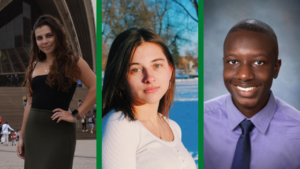
The AAG is excited to welcome two new interns coming aboard our staff for the Fall of 2020! Joining us this semester are Jenna Pulice, a senior at Penn State University pursuing a Bachelor of Science in geography, with a minor in climatology, and certificates in GIS and human/societal geographies, and Mei Harrison who is a junior at The George Washington University and is pursuing a B.A. in Geography and International Affairs with a concentration in international development. We are also grateful to have one of our summer interns continue working with us this semester, Sekour Mason, who is a recent graduate from the University of Maryland, College Park with a Bachelor’s of Science degree in Geographical Sciences: GIS and Computer Cartography.
Meet the fall interns.
POLICY CORNER
ICE Proposes Major New Restrictions to International Student Visas
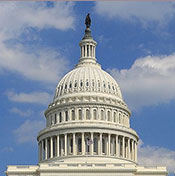 The following update comes from our colleagues at the Consortium of Social Science Associations (COSSA).
The following update comes from our colleagues at the Consortium of Social Science Associations (COSSA).
On September 25, the Department of Homeland Security’s Immigration and Customs Enforcement (ICE) released a proposed rule fixing the initial visa term for all international students, exchange visitors, and foreign media representatives to four years, among other restrictions. Furthermore, the proposal would restrict the initial visa term to two years for individuals born in countries designated as state-sponsors of terrorism and citizens of countries with student and exchange visitor overstay rates over 10 percent. Applications to extend the duration of the visa would be possible “if the additional time needed is due to a compelling academic reason, documented medical illness or medical condition, or circumstance that was beyond the student’s control.” Other restrictions included in the proposal are capping the number of times an international student can change majors or degree levels while on a visa, limiting allowed English language training to two years over the student’s lifetime, and giving ICE the discretion to approve or deny stay applications. Current international student visas would not be affected.
The rule proposal has been criticized by many in the higher education community due to concerns it would unnecessarily bar international students from studying in the U.S., some noting that academic programs frequently take longer than the proposed maximum initial visa term of four years. However, since the rule finalization process may not be completed before January 20, 2021, a change in the Presidential administration could prevent any changes from occurring.
Stakeholder comments on the proposal will be accepted through October 26, 2020. The proposal can be read in full in the Federal Register.
In the News:
- House Speaker Nancy Pelosi and Treasury Secretary Steven Mnuchin had been continuing talks to reach a compromise for another COVID-19 stimulus package, which would deliver much needed support for vulnerable Americans who have been in limbo since the CARES Act has expired. However, President Trump announced in a tweet Tuesday that Republican efforts to negotiate will stop until after the election. This all but ensures that no additional relief will be provided until November.
- Senate Republicans are pushing for a speedy confirmation for Supreme Court nominee Judge Amy Coney Barrett, despite two members of the Senate Judiciary Committee – Sens. Mike Lee and Thom Tillis – testing positive for COVID-19. Senate Democrats contend that a confirmation should not happen with only a few short weeks left before a major Presidential and Congressional election. The committee hearings are scheduled to begin Oct. 12th.
- A Continuing Resolution (CR) to avert a government shutdown on Oct. 1st was passed by Congress and signed by the president at the end of September. The CR extends current FY20 government funding levels until Dec. 11th
MEMBER NEWS
Profiles of Professional Geographers
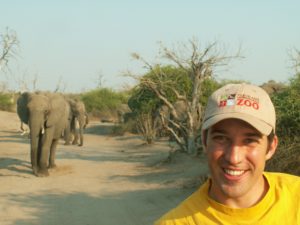
Meet Tim Fullman who is a Senior Ecologist at The Wilderness Society and featured this month in our profiles of professional geographers series. Tim knows that his training in geography has served him well in his work with caribou migrations. For geographers seeking jobs, Tim stresses that they “Build a strong toolkit that includes both analytical skills and a demonstrated ability to communicate clearly in both written and spoken formats. It is important to show what you can do through experiences working with people in communities, even as you conduct research. This shows that you can not only do sound science, but also engage well with stakeholders and other interested parties.”
Learn more about Geography Careers on the recently updated AAG Jobs & Careers website.
October Member Updates
The latest news from AAG Members.
Geographer Austin Kocher of Syracuse University was recently interviewed about immigration detention in The New York Times. More.
AAG Councilor Jennifer Collins recognized as 2020 Undergraduate Research Mentor Awardee by the Geosciences Division of the Council on Undergraduate Research (CUR). More.
AAG Highlights Advancing Discipline Diversity During Geography Awareness Week at Michigan State University

This year, AAG will once again honor its three-year, $30,000 commitment to the Advancing Geography Through Diversity Program (AGTDP), an initiative of the Department of Geography, Environment, and Spatial Sciences at Michigan State University (MSU). The program’s goal is to recruit and support underrepresented graduate students who are African-American, Latinx, and Native American, who are seeking to obtain either a Master’s or Doctorate in Geography. Students admitted to the MSU Department of Geography, Environment, and Spatial Sciences via AGTDP receive full funding.
AAG presented its first check during MSU’s Geography Awareness Week celebration in 2019, in the amount of $10,000. Dr. Karen Johnson-Webb, current secretary on AAG’s Executive Committee and the first African American to earn a master’s degree in geography from MSU (1994), spoke at the event, praising the tireless efforts and mentoring of 2019 AAG Lifetime Achievement recipient Dr. Joe Darden, a professor of geography at MSU for nearly 50 years.
AAG will provide the second installment of funding this month, as Geography Awareness Week 2020 approaches in November.
Learn more about the program.
RESOURCES AND OPPORTUNITIES
Upcoming AAG Grants and Awards Deadlines – October 15 and November 1

Please consider submitting applications or nominations to four AAG grants and awards with approaching deadlines, three for students and one for career geographers. The AAG Marble-Boyle Undergraduate Achievement Awards aim to recognize excellence in academic performance by undergraduate students from the U.S. and Canada who are putting forth a strong effort to bridge geographic science and computer science. The AAG Harold M. Rose Award for Anti-Racism in Research and Practice honors geographers who have served to advance the discipline through their research, and who have also had an impact on anti-racist practice. Lastly, the AAG Community College Travel Grants support outstanding students from community colleges, junior colleges, city colleges, or similar two-year educational institutions to attend the next AAG Annual Meeting. Community College Travel Grant applications are due November 1, 2020 while nominations and applications for the three awards are due October 15, 2020.
See all grants and awards deadlines.
Instructors Sought: Geography Methods during a Pandemic
The AAG is seeking instructors to develop virtual seminars or virtual workshops for our learning series on adapting research methods during the COVID-19 pandemic. Designed for graduate students, the series will take place between November 2020 and February 2021. A stipend of $1,500 is available to instructors and seminar leaders.
Find out more and apply on or before Friday, October 15, 2020.
Volunteer as a Career Mentor at the 2021 AAG Annual Meeting
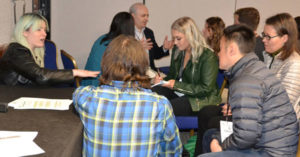
The AAG seeks panelists, career mentors, workshop leaders and session organizers for careers and professional development activities at the 2021 AAG Annual Meeting in Seattle, WA. Individuals representing a broad range of employment sectors, organizations, academic and professional backgrounds, and racial/ethnic/gender perspectives are encouraged to apply. If interested, email careers [at] aag [dot] org, specifying topic(s) and activity(s) of interest, and attach a current C.V. or resume. For best consideration, please submit your information by November 20, 2020.
Get involved with the AAG Jobs and Careers Center.
AGS to Host Annual Geography 2050 Online
This year’s Geography 2050 Symposium from the American Geographical Society will focus on the future of the world’s oceans. Held virtually November 16-20, 2020, the event features 7 themes related to vital trends shaping oceans worldwide and will host a wide range of speakers from government agencies, industry leaders, and academia.
Learn more.
Upcoming Virtual Events at the Kauffman Foundation
 AAG members are invited to attend two virtual events hosted by the Kauffman Foundation. On Thursday, October 29, the Entrepreneurship Issue Forum on “Health, Healthcare Access and Entrepreneurship: What Does It Mean for Entrepreneurship Support?” will take place at 9:00 a.m. CT. The forum will discuss the role of health status and mental health for entrepreneurs, and the evidence on how health care access affects entrepreneurship. Click here to register.
AAG members are invited to attend two virtual events hosted by the Kauffman Foundation. On Thursday, October 29, the Entrepreneurship Issue Forum on “Health, Healthcare Access and Entrepreneurship: What Does It Mean for Entrepreneurship Support?” will take place at 9:00 a.m. CT. The forum will discuss the role of health status and mental health for entrepreneurs, and the evidence on how health care access affects entrepreneurship. Click here to register.
On October 23 at 10:00 a.m. CT, some of the recipients in the Kauffman Foundation’s 2018 Knowledge Challenge student track will share their work, learnings from conducting their research projects, and early/ongoing research findings. Click here to register.
IN MEMORIAM
The AAG is saddened to hear of the passing of these colleagues.
Norman Thrower died at the age of 100 on September 2, 2020. An avid traveler, Thrower started his career working for the Survey of India as a cartographer during WWII. Later, Thrower was a geography professor at UCLA from 1957 to 1990 where he specialized in cartography, remote sensing, and Europe. Thrower received the AAG Lifetime Achievement Honors in 1998. More.
Tyrel (Tink) Moore, Professor Emeritus in Geography and Earth Sciences at University of North Carolina Charlotte, passed away on September 14, 2020. A scholar of the South, Tink arrived at University of North Carolina Charlotte in 1982. It is estimated that he taught more than 20,000 undergraduates as well as a significant portion of the Charlotte region’s urban planners. Tink was a beloved member of the department, serving as a mentor for many in all stages of their careers. More.
Mesfin Woldemariam, a political geographer, longtime politician, and human rights activist in Ethiopia, died at the age of 91 on September 29, of complications from COVID-19. He was one of the founders of the Ethiopian Human Rights Council (EHRCO) in 1991 which was “the country’s first civil society organization exclusively dedicated to the cause of human rights at a time when repression was rife following years of military rule in the country,” according to Amnesty International. He was the author of numerous books on the social, political, economic and historical issues of Ethiopia, and served for a time in prison for what was widely seen as retaliation against him for his work with Coalition for Unity and Democracy. More.
GEOGRAPHERS IN THE NEWS
EVENTS CALENDAR
- October 16-17, 2020 – *Virtual Event* Middle States Regional Division Fall Meeting
- October 18-20, 2020 – *Virtual Event* 43rd Annual Meeting of the Applied Geography Conferences
- October 22-23, 2020 – *Virtual Event* Race, Ethnicity, Place and the Covid-19 Pandemic
- October 22-23, 2020 – *Virtual Event* Middle Atlantic Regional Division Fall Meeting
- October 29-30, 2020 – *Virtual Event* East Lakes Regional Division Fall Meeting
- November 6-7, 2020 – *Virtual Event* Southeast Regional Division Fall Meeting
- November 13, 2020 – *Virtual event* West Lakes Regional Division Fall Meeting
- November 14, 2020 – *Virtual Event* New England St. Lawrence Valley Regional Division Fall Meeting
- November 17-19, 2020 – *Virtual Event* Southwest Regional Division Fall Meeting
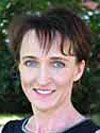 No matter what happens with this week’s election, the United States will pivot.
No matter what happens with this week’s election, the United States will pivot.


 Last month I shared
Last month I shared  Four themes have been selected for the Seattle, WA annual meeting. Because of the extraordinary circumstances of the 2020 AAG Annual Meeting, three of the themes have been retained from 2020:
Four themes have been selected for the Seattle, WA annual meeting. Because of the extraordinary circumstances of the 2020 AAG Annual Meeting, three of the themes have been retained from 2020: 
 Read the latest issues of all of the AAG journals online:
Read the latest issues of all of the AAG journals online: Several of the regional divisions of the AAG will host their annual meetings virtually during October and November. For those who have not recently attended a regional division meeting, they provide an excellent way to connect with geographers in your area in a more intimate setting than the AAG Annual Meeting. The regional division meetings also promote a supportive environment for student presentations of geographic research. Students are encouraged to apply for the
Several of the regional divisions of the AAG will host their annual meetings virtually during October and November. For those who have not recently attended a regional division meeting, they provide an excellent way to connect with geographers in your area in a more intimate setting than the AAG Annual Meeting. The regional division meetings also promote a supportive environment for student presentations of geographic research. Students are encouraged to apply for the 
 The following update comes from our colleagues at the Consortium of Social Science Associations (COSSA).
The following update comes from our colleagues at the Consortium of Social Science Associations (COSSA).



 AAG members are invited to attend two virtual events hosted by the Kauffman Foundation. On Thursday, October 29, the Entrepreneurship Issue Forum on “Health, Healthcare Access and Entrepreneurship: What Does It Mean for Entrepreneurship Support?” will take place at 9:00 a.m. CT. The forum will discuss the role of health status and mental health for entrepreneurs, and the evidence on how health care access affects entrepreneurship.
AAG members are invited to attend two virtual events hosted by the Kauffman Foundation. On Thursday, October 29, the Entrepreneurship Issue Forum on “Health, Healthcare Access and Entrepreneurship: What Does It Mean for Entrepreneurship Support?” will take place at 9:00 a.m. CT. The forum will discuss the role of health status and mental health for entrepreneurs, and the evidence on how health care access affects entrepreneurship.  Jenna Pulice is a senior at Penn State University pursuing a Bachelor of Science in geography, with a minor in climatology, and certificates in GIS and human/societal geographies. She is beginning the process of applying to graduate programs in geography and/or climate science and is also considering spending time abroad on a work visa to continue exploring new places. She is passionate about climate change, and enjoys traveling, scuba diving, and doing anything outdoors, especially when she can photograph it.
Jenna Pulice is a senior at Penn State University pursuing a Bachelor of Science in geography, with a minor in climatology, and certificates in GIS and human/societal geographies. She is beginning the process of applying to graduate programs in geography and/or climate science and is also considering spending time abroad on a work visa to continue exploring new places. She is passionate about climate change, and enjoys traveling, scuba diving, and doing anything outdoors, especially when she can photograph it.

